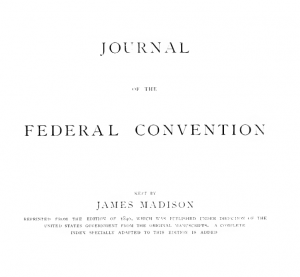Summary
The delegates debated the number of houses for the legislative function. The delegates voted down a motion for a unicameral legislature.
Influences on the Constitution
England formed an easy illustration for James Wilson on the subject of representation.
The point of representation could receive no elucidation from the case of England. The corruption of the boroughs did not proceed from their comparative smallness; but from the actual fewness of the inhabitants, some of them not having more than one or two. A great inequality existed in the counties of England. Yet the like complaint of peculiar corruption in the small ones had not been made. It had been said that Congress represent the State prejudices, — will not any other body whether chosen by the Legislatures or people of the States, also represent their prejudices?
Col. Mason also referred to Britain:
He thought with his colleague (Mr. RANDOLPH,) that there were, besides, certain crises, in which all the ordinary cautions yielded to public necessity. He gave as an example, the eventual treaty with Great Britain, in forming which the Commissioners of the United States had boldly disregarded the improvident shackles of Congress; had given to their country an honorable and happy peace, and, instead of being censured for the transgression of their powers, had raised to themselves a monument more durable than brass. The impracticability of gaining the public concurrence, he thought, was still more groundless.
As an influence, Mason appealed to what “the people” would accept:
Is it to be thought that the people of America, so watchful over their interests, so jealous of their liberties, will give up their all, will surrender both the sword and the purse, to the same body, — and that, too, not chosen immediately by themselves? They never will. They never ought. Will they trust such a body with the regulation of their trade, with the regulation of their taxes, with all the other great powers which are in contemplation? Will they give unbounded confidence to a secret Journal, — to the intrigues, to the factions, which in the nature of things appertain to such an assembly? If any man doubts the existence of these characters of Congress, let him consult their Journals for the years ’78, ’79, and ’80. It will be said that, if the people are averse to parting with power, why is it hoped that they will part with it to a national Legislature? The proper answer is, that in this case they do not part with power: they only transfer it from one set of immediate representatives to another set. Much has been said of the unsettled state of the mind of the people. He believed the mind of the people of America, as elsewhere, was unsettled as to some points, but settled as to others. In two points he was sure it was well settled, — first, in an attachment to republican government; secondly, in an attachment to more than one branch in the Legislature. Their constitutions accord so generally in both these circumstances, that they seem almost to have been preconcerted. This must either have been a miracle, or have resulted from the genius of the people. The only exceptions to the establishment of two branches in the Legislature are the State of Pennsylvania, and Congress; and the latter the only single one not chosen by the people themselves. What has been the consequence? The people have been constantly averse to giving that body further powers.
James Wilson, like Madison and Hamilton, appealed to past and current confederacies as well as the experience of the states.
Mr. WILSON urged the necessity of two branches; observed, that if a proper model was not to be found in other confederacies, it was not to be wondered at. The number of them was small and the duration of some at least short. The Amphictyonic and Achæan were formed in the infancy of political science; and appear, by their history and fate, to have contained radical defects. The Swiss and Belgic confederacies were held together, not by any vital principle of energy, but by the incumbent pressure of formidable neighboring nations. The German owed its continuance to the influence of the House of Austria. He appealed to our own experience for the defects of our confederacy. He had been six years, of the twelve since the commencement of the Revolution, a member of Congress, and had felt all its weaknesses. He appealed to the recollection of others, whether, on many important occasions, the public interest had not been obstructed by the small members of the Union.
1787 Constitutional Convention Series
To read my series examining the proceedings of the Constitution Convention, click here. In this series, I am writing about any obvious influences on the development of the Constitution which were mentioned by the delegates to the Convention. Specifically, I am testing David Barton’s claim that “every clause” of the Constitution is based on biblical principles. Thus far, I have found nothing supporting the claim. However, stay tuned, the series will run until mid-September.
Constitutional Convention Series (click the link)
To follow on social media, click the following links:
Facebook (blog posts and news)
Facebook (Getting Jefferson Right – history news)
Twitter


